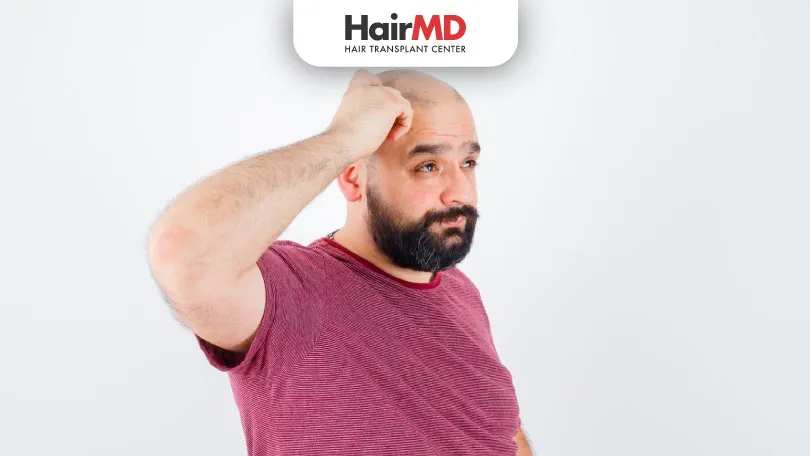21st June, 2022

Obesity and hair loss have become common concerns worldwide. While it is observed and experienced that obesity can lead to several complications, many wonder about its linkage with hair loss. Can obesity lead to hair loss?
Many people who are already suffering from obesity or gained significant weight recently ask this. So, let’s explore a few aspects of obesity-related hair loss.
What’s covered in the article?
- Can Obesity Lead to Hair Loss?
- How to Deal with Obesity-Related Hair Loss?
- Conclusion
Can Obesity Lead to Hair Loss?
So, let’s answer your question straight away. Obesity is a severe concern that affects millions worldwide. It can put the individual at risk of type 2 diabetes, heart disease, and many other problems, which could in turn progress to various complications.
It might interest you to know that obesity does not directly cause hair loss. But there’s an indirect connection of which you should be aware. So, how does obesity affect hair loss?
Obesity can result in hormonal imbalance, particularly an increase in the production of androgens, like dihydrotestosterone (DHT). Increased DHT levels can shrink hair follicles, thus resulting in hair thinning and hair loss.
In women, obesity or being overweight can result in Polycystic Ovary Syndrome. It has become a common reproductive problem among young women which leads to menstrual irregularities due to hormonal imbalance, insulin resistance, acne, facial hair, thyroid hormonal imbalance. In addition, it can trigger hair loss as it is associated with higher free -l testosterone levels that affect hair growth.
How to Deal with Obesity-Related Hair Loss?
Dealing with obesity related hair loss requires you to make some lifestyle changes. Some of them may include the following.
Regular Exercises
Sedentary lifestyles, irregular eating habits, and lack of exercise together wreak havoc in many people’s lives. Obesity is one of the most significant damages that these lifestyle-related aspects gradually translate to over a period.
Accordingly, some changes include indulging in adequate physical activity and modifying your eating habits, which involve eating on time and maintaining a balanced diet. The diet helps keep your body healthy from within. But exercise helps to recover obesity and subsequently hormonal imbalance.
Hormone Regulation
Obesity results in hormonal imbalances that result in hair loss. Small initiatives can help you manage your body weight and help regulate your hormones. While helping improve hair growth, managing your weight also helps balance your hormones. It can help reduce cravings, regulate hunger cycles, and enhance your overall well-being.
Reducing Your Stress
Obesity has a strong relation to stress. Chronic high-stress levels trigger hormonal imbalance, inactivity, stress eating and ultimately hair loss. . Engaging in some physical activities, meditation, Yogasan, taking out time for hobbies, etc., can help you manage stress and foster positive results over a timeframe.
So, although obesity does not directly impact hair loss. It has a relationship with it and can stimulate the hair loss process. However, it should be noted that obesity causes many other health problems, probably more critical than hair loss. Accordingly, you should maintain healthy weight levels via regular physical activity and a regular diet.
Connect with HairMD if you are looking for effective solutions for hair loss. We are a team of qualified and experienced dermatologists who provide personalized hair treatment solutions based on comprehensive diagnosis and extensive counseling.
Do You Know?
Nearly 250 Patients Visit HairMD
Everyday For Various Hair Concerns?
(Your journey to healthier and fuller hair starts here!)
Meet Our Dermatologists
Conclusion
Obesity does not directly cause hair loss, but it can contribute to it through hormonal imbalances, particularly increasing DHT levels, which can lead to hair thinning. In women, obesity-related conditions like Polycystic Ovary Syndrome (PCOS) may also trigger hair loss. Managing weight through regular exercise, balanced diet, and reducing stress can help mitigate the effects of obesity on hair health.
Further Reading
Top Kitchen Ingredients to Boost Hair Growth
Discover the best kitchen ingredients for hair growth! Use coconut oil, onion juice, aloe vera & more to nourish your hair naturally and reduce hair fall.
How to Treat Alopecia Areata at Home: Natural Solutions for Hair Growth
Explore home remedies for alopecia areata to promote hair regrowth and boost confidence from home.
Redensyl vs. Minoxidil: Which is the Better For Hair Growth?
Discover the differences between Redensyl and Minoxidil for hair growth. Learn about their effectiveness, side effects, and which treatment might be better for you.
Biotin-Rich Foods for Natural Hair Growth
Know the best foods rich in biotin to help your hair to grow naturally stronger and healthier by experts from HairMD, Pune
Have thoughts? Please let us know
We are committed not only to treating you, but also educating you.











